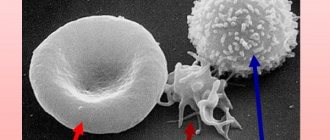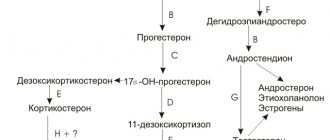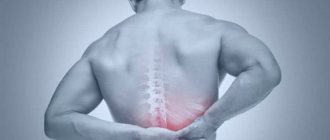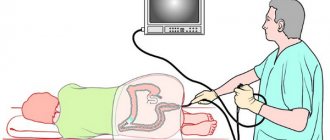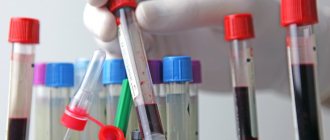Development mechanisms
To understand why sudden, causeless nausea occurs, it is necessary to understand the mechanisms of its development. Doctors distinguish several varieties:
- central;
- reflex;
- visceral;
- motor;
- hematogenous-toxic.
Central
The cause of the development of the central variety can be inflammatory and infectious pathologies occurring directly in the brain and/or its membranes. Provocateurs include: concussions, head injuries, benign/malignant brain tumors. Accompanies arterial hypertension and may indicate the development of a hypertensive crisis.
Visceral
Visceral nausea is a sign of problems with the gastrointestinal tract (GIT). It occurs as a symptom of stomach cancer, ulcerative pathologies, inflammation of the pancreas, cholecystitis, gastritis.
Nausea may be a sign of gastrointestinal disease
This type often develops against the background of the following pathologies:
- inflammation of the pharynx;
- pleurisy;
- myocardial infarction;
- renal colic;
- thrombosis.
Motor
Motor nausea develops during inflammatory/infectious pathologies of the ear, as well as disturbances in the functioning of the vestibular apparatus.
Hematogenous-toxic
Sudden nausea in this case occurs as the body’s response to exposure to toxic substances. Often found in patients diagnosed with renal failure, endocrine pathologies, all types of tumors, as well as during pregnancy.
Important! The cause of its development may be the use of certain medications. In this case, it is considered as a side effect.
Nausea before bed: explanation of the phenomenon
Nausea occurs for many reasons. The main one is irritation of the splanchnic and vagus nerves. At the same time, the tone of the stomach walls decreases and peristalsis slows down.
The visual and olfactory sensors are irritated. The vomiting center is excited, first begins to feel nauseous, then vomiting begins.
Nausea occurs more often in women than in men due to their greater sensitivity and nervous excitability. But the reasons for its occurrence are almost the same, except for one thing: the stronger half does not suffer from ailments that appear as a result of pregnancy. This symptom comes in different types:
- toxic, resulting from poisoning with poisons, toxins;
- cerebral, caused by brain diseases, hypertension;
- metabolic, based on metabolic and endocrine processes disorders;
- reflex, which occurs when the gastrointestinal tract is irritated;
- vestibular, associated with impaired coordination of movement, accompanied by dizziness.
For successful therapy, it is necessary to conduct diagnostic studies and collect a detailed medical history. Then it will be easier to deal with the cause of the problem, unpleasant symptoms can be relieved faster, and the patient’s condition can be improved.
https://youtu.be/yp1qfkoQseU
Causes not related to existing diseases
Severe nausea sometimes occurs as the body’s response to uncomfortable conditions. Quite often, attacks occur against the background of a weak vestibular apparatus. If a person gets motion sickness while traveling, then taking special pills will help get rid of the nausea.
The causes of sudden nausea and subsequent vomiting in an adult may lie in psychological problems. Provoking factors can be a state of severe fear, being in a stressful situation, or severe nervous tension. Breathing exercises will help relieve an attack.
Mild lightheadedness with vomiting sometimes develops in a person after arriving in a new, unfamiliar place
There are other reasons. This:
- Severe physical or emotional fatigue, lack of sleep. The body needs daily rest and if it does not receive it, it responds with various uncomfortable conditions. One of these is attacks of severe nausea.
- Poisoning, development of intestinal infection. Emptying of the stomach is typical for the pathology, but sometimes the patient feels only nausea, without vomiting.
- Side effect caused by taking medications. Some drugs can cause nausea and even vomiting.
- Development of gestation. The first months of bearing a child are characterized by constant attacks of lightheadedness. Sometimes they end in vomiting.
- Migraine. For this type of headache, nausea is a typical condition.
- Brain concussion. The pathology is accompanied by dizziness and severe nausea. Sometimes the latter ends in vomiting.
The cause of lightheadedness can be a person’s diet. It is provoked by hunger, overeating, and excessive indulgence in sweets.
Reasons of a physiological nature
It is unfortunate that nausea that lasts for a long time almost never brings the desired relief. Here it can be compared to a sudden attack that ends in vomiting. On the contrary, nausea in the evening is debilitating, prevents normal sleep and significantly reduces the quality of sleep. This is especially unpleasant if other symptoms are added to this process, for example, weakness, stomach pain or dizziness, or even all at once.
Most often, the feeling of being sick is not accompanied by illness. Nausea can be caused by poor diet or lifestyle, that is, external factors that can be easily detected and corrected. Polluted and gassed city air can provoke attacks in the evening, since all the dirt that rises into the air during the day falls down, having a negative impact on people with poor health. And if you have irritating substances in your bedroom such as perfumes, tobacco smoke, household chemicals, etc., then nausea in the evening simply cannot be avoided.
The most common cause of nausea in the evenings is living under severe stress and overwork. These factors provoke an increase in pressure, which, in turn, leads to nausea, weakness, loss of orientation, cold sweat, dizziness, sparks and darkness in the eyes. Hypertensive people are more likely than others to feel evening nausea, so if you have a tendency to increase blood pressure, it is better to have a blood pressure monitor and medications in the house to bring you to your senses.
Nausea at night can be triggered by noticeable overeating the day before, especially if you allowed yourself to consume a large amount of fried and fatty foods. The digestive system simply turns out to be unprepared to go into emergency mode at a time when it is supposed to rest, so your body simply strives to get rid of the excess, provoking vomiting. This is a normal protective reaction of the body to overeating.
Often people experience nausea after heavy alcoholic libations, which is natural, since alcoholic drinks are a real poison for your body. The liver neutralizes a small amount of alcohol using its own enzymes, but such work is very difficult for it.
If you’ve obviously had too much alcoholic drinks, then the body again turns on a defensive reaction: you feel sick at night if you’ve consumed too much alcohol in the evening.
Nausea caused by physiological reasons occurs quite rarely and is neutralized as soon as you eliminate the immediate cause of your cloudiness. It is the ability to eliminate nausea at night by stopping the causes of its manifestation that allows us to say that there are no pathologies in your body.
Attacks of nausea due to illness
Nausea occurs as a symptom of an existing pathology. Seizures can be provoked by:
What to do if your child feels nauseous and has a stomach ache?
- Gastritis and ulcerative pathology of the stomach/duodenum. A typical sign of pathology is nausea after eating. The resulting vomiting brings relief to a person.
- Inflammation of the gallbladder. Frequent attacks of lightheadedness can be caused by cholecystitis. The sensations intensify while eating. It is possible that a bitter taste may appear in the mouth. A typical symptom of cholecystitis is pain in the right hypochondrium.
- Pancreatitis (inflammation of the pancreas). Nausea after eating and slight bloating are likely symptoms of the disease. The pathology is also characterized by weight loss and the appearance of an unpleasant taste in the mouth.
- Inflammation of the appendix. Nausea is one of the possible signs of a pathological condition. Additional signs include pain in the lower abdomen (left quadrant) and increased body temperature.
- Hypertonic disease. The development of an attack of lightheadedness is accompanied by an increase in blood pressure and redness of the face.
- Heart failure. The disease is characterized by prolonged nausea.
- Hypothyroidism. Nausea is also one of the signs of pathology of the endocrine system. As a rule, it is accompanied by weakness and lack of appetite.
- Inflammation of the renal system. The formation of nausea that does not end with vomiting may indicate the development of renal pathology. Accompanied by pain in the kidney area.
- Meningitis is an inflammation of the lining of the brain. The disease is characterized by nausea and high body temperature accompanied by severe headaches.
If pathological symptoms develop, in order to diagnose the pathology, consultation with a qualified specialist is necessary.
What to do - how to quickly relieve signs of nausea?
It is believed that treatment of nausea is not advisable, since it is not an independent disease. This is just one of the symptoms of the underlying disease. Despite this, there is one proven and universal way to relieve such an unpleasant sign of the disease. It is necessary to take a horizontal position. Namely, lie on your stomach. The right hand is clenched into a fist and placed under the peritoneum directly into the navel area.
You need to lie on the formed fist for 5-10 minutes and take sharp, deep breaths. In most cases, during the specified time, a reflex relaxation of the muscle fibers responsible for spasm and vomiting occurs. This method is indicated for everyone except pregnant women and children under 6 years of age.
When there are any health disorders, the human body begins to signal about it. One of the warning signs is causeless nausea. Everyone is accustomed to associating this symptom in women with pregnancy, but this is not always the case. Nausea can be bothersome in the morning or throughout the day, be long-lasting or short-term, end with vomiting or go away on its own and unexpectedly. This unpleasant sensation significantly reduces a woman’s quality of life. In case of such deterioration in health, it is advisable to immediately consult a doctor and undergo an examination.
Causes of morning sickness
There are many reasons for nausea that occurs in the morning. The most common are the following: evening overeating, morning hunger, excessive intake of alcoholic beverages, taking medications on an empty stomach.
Sudden nausea in the morning may be the first sign of pregnancy
One of the harmless reasons why there are attacks of lightheadedness in the morning is pregnancy. Many women suffer from this symptom of early toxicosis. As a rule, the condition stabilizes by the beginning of the second trimester.
Attacks in the evening and at night
Most often, uncomfortable conditions for a person develop in the evening and at night, nausea is no exception. Severe evening nausea can be a sign of significant physical fatigue. The reason could be, for example, irregular working hours.
The next likely reason is overeating in the afternoon. As evening approaches, the rate of metabolic reactions decreases, which leads to slower functioning of the digestive tract. Food stays in the stomach for a long time, which causes nausea.
To avoid the development of an uncomfortable condition, it is necessary to refrain from eating foods that are difficult to digest. The food should be light and the portions should be small. Pathological conditions, in particular dysbacteriosis or inflammation of the appendix, can also be causes of evening and night nausea.
Late intake of medications can provoke an attack of lightheadedness in the evening or at night
Methods of therapy and relief from symptoms
You can get rid of attacks that torment you at night and prevent you from getting a good night’s sleep using various methods. These include medications, folk recipes and nutritional correction.
Treatment can begin with taking medications that will help reduce the severity of symptoms. Among these the following can be noted:
- "Allohol." The drug perfectly removes toxic substances, thanks to the activated carbon it contains. As a result of taking it, bile separation improves.
- "Holenzym." Normalizes the functioning of the gastrointestinal tract. The composition includes enzymes of the pancreas and bile.
- "Polysorb". It copes well with intoxication of the body as a result of food poisoning, relieves intestinal infections, and helps women cope with toxicosis.
- "Tanakhetsol."
- "Cerucal". Eliminates vomiting, tones the digestive tract, reduces the manifestations of biliary dyskinesia.
A remedy for relieving a symptom should always be chosen depending on the reasons that provoked it.
If you feel sick at night, and you don’t know what to do, it is recommended to use available folk recipes:
- Inhale “Ammonia” or put a “Validol” tablet under your tongue.
- Prepare a nettle decoction with milk. To do this, pour a teaspoon of herbs into a glass of milk, bring to a boil and simmer for several minutes. After cooling, drink a third of a glass, and then finish it within 3 hours, taking a tablespoon at a time. The decoction relieves nausea and eliminates the gag reflex.
- Grind the ginger root, pour 300 ml of boiling water and leave to steep. After cooling, drink in small sips.
- A herbal mixture of chamomile, rosemary and sage will help. Take a spoonful of each raw material, add 1.5 liters of boiling water, and leave. After cooling, drink small portions every 15 minutes.
- At the first symptoms of nausea, you can use lemon juice. Squeeze out half of the fruit and combine with soda. Take the product with a small amount of water.
- Freshly squeezed potato juice. The product perfectly relieves not only nausea, but also eliminates the desire to vomit. Take a teaspoon before meals on an empty stomach.
- If the cause of such an unpleasant condition is stress or nervous tension, then you can prepare chamomile tea from a tablespoon of raw materials and a glass of boiling water.
Mechanism of nausea
We must remember that in the presence of serious pathologies that have become the culprit for the appearance of nausea in the evenings, any means will only bring temporary relief. Treatment of the underlying disease is required.
The diet has a direct impact on the condition and functioning of the digestive tract. If there are errors in nutrition, unpleasant symptoms in the form of nausea will definitely bother you. Recommendations for correcting the menu can be given as follows:
- Reduce consumption of fatty foods.
- Reduce the amount of sugar.
- Eliminate fast foods and smoked foods from your diet.
- Do not eat canned foods.
- All chips and crackers are prohibited.
- If nausea is caused by poisoning, then you need to drink a lot. Thirst can be quenched with still mineral water, tea, and juices.
Food should be varied and healthy. Add to menu:
- lean meats;
- soups and jellies;
- cereal porridge;
- pasta;
- potato;
- fresh fruit, especially bananas and lemons.
After reviewing the diet, the functioning of the digestive tract improves; often after such measures, nausea disappears without a trace.
If pathologies that can cause such an unpleasant symptom as nausea are promptly identified and treated, then this can be prevented. Among the preventive measures are the following:
- You can prevent poisoning by carefully monitoring the expiration dates of products purchased in stores.
- Lead an active lifestyle, then the cardiovascular system will be normal, and the manifestations of VSD will reduce their intensity.
- Eliminate bad habits from your life.
- Avoid stressful situations; if this is not possible, then learn relaxation techniques.
- Eat rationally and properly. Don't go to bed with a full stomach.
If nausea interferes with sleep or prevents you from falling asleep, then to eliminate the symptom it is important to identify the cause that provokes it. You cannot do without a visit to the doctor if unpleasant sensations accompany you almost regularly. We must always remember that there are life-threatening pathologies that manifest themselves precisely through nausea.
Attack after eating
Nausea after eating, as a rule, indicates the development of pathologies of the gastrointestinal tract. The cause may be inflammation of the gastric mucosa. The following symptoms are typical for the disease:
- pain in the epigastric region, intensifying after eating;
- nausea;
- belching;
- increased gas formation;
- copious secretion of saliva.
In most cases, inflammation is caused by the introduction of the bacterium Helicobacter pylori into the gastric mucosa. Ulcerative pathology is also accompanied by nausea. Additional symptoms include acute pain in the epigastric area, heartburn, and vomiting.
Pain occurs 1.5–2 hours after eating. Often at night or in the morning. Signs of duodenitis, in addition to lightheadedness, include a feeling of fullness and pain in the stomach, heartburn, increased gas formation, and loss of appetite.
The cause of sudden lightheadedness may be a disease of the digestive system
Nausea can be caused by cholecystitis. Its signs:
- nausea and belching that occurs after eating;
- pain in the epigastric region;
- bitter or metallic taste in the mouth;
- bloating.
INFLAMMATORY PROCESS IN THE KIDNEYS
DETAILS. Nausea is not associated with food, temperature up to 38–40º C, sometimes vomiting. Pain (aching, dull or paroxysmal) in the lower back (less often in the abdomen), chills. Possible urinary problems.
WHAT TO DO . Consultation with a therapist, nephrologist, urologist. For acute symptoms, it is better to call an ambulance. There will be general and special urine tests, general and biochemical blood tests, ultrasound of the kidneys and other organs of the urinary system. You will need a diet and a course of medications, including antibiotics, if the inflammation is caused by an infection. Sometimes surgery is needed.
Help at home
How to relieve an attack of nausea without using medications? There are many safe and effective options. A contraindication is an individual reaction to prescription components.
To relieve an attack of nausea, you can use the following methods:
- Cut a lemon and smell it. Relief will occur in about 2-3 minutes. The inhalation should be deep and slow.
- Pour a teaspoon of fennel seeds into a glass of boiling water and leave for 10–15 minutes. Filter and add a little honey and lemon juice to the drink. Drink in small sips throughout the day. Prevents the development of nausea. The drink is allowed during pregnancy.
- Wrap ice cubes in a soft cloth and place on the neck (back) and forehead.
- Apply 2-3 drops of peppermint ether to the fabric and breathe in the aroma. Oil can be added to the aroma lamp.
- If you have persistent morning sickness caused by lack of sleep or pregnancy, you should prepare a mint drink in the evening. To do this, brew a spoonful of herbs in 150 ml of boiling water and leave overnight. In the morning, you should drink the drink in small sips without getting out of bed.
- Ginger helps relieve nausea. You need to grate a small root and pour a glass of boiling water. Leave to brew, filter and add a little honey to it. Drink warm. The recommended norm is 3 glasses per day. Ginger drink cannot be combined with anticoagulants - heparin - and appendicitis.
- Cloves will help you quickly get rid of nausea. You need to chew a small umbrella or drink tea to which you add 1 clove. An aroma session with clove ether gives good results. Apply a few drops to any fabric and breathe in the spreading aroma a little.
Cloves are one of the remedies used in folk recipes to relieve attacks of lightheadedness and nausea.
Nausea is a very unpleasant condition that requires urgent action. If it becomes permanent and is accompanied by the development of additional pathological symptoms, it is recommended to obtain qualified medical advice and undergo a full medical examination.
Methods for treating the syndrome
The manifestation of nausea in the evening, especially if this ailment has become regular and is accompanied by other alarming symptoms, is a reason to consult a doctor. It will be necessary to undergo various examinations to make a diagnosis and prescribe treatment.
Attention! When nausea is accompanied by abdominal pain, you should call an ambulance. These may be signs of a serious pathology, perhaps even life-threatening to the patient.
Medication
There are medications to relieve nausea. Their action is aimed at increasing the secretion of bile. These are “Allohol”, “Holenzym”, “Silimar”, they are prepared from natural ingredients. Medicines help remove toxins from the body, relieve intoxication and thereby alleviate the condition. You can use Holosas syrup, made from rose hips.
The drug Cerucal has a different mechanism of action. It is based on the blocking of seratonin and dopamine receptors by the substance metoclopromide. The threshold of excitability of the vomiting center increases, the motor activity of the walls of the esophagus decreases, and the movement of food through the small intestine accelerates.
If the cause of nausea is endocrine problems, diseases of the nervous system and other pathologies, only a doctor should select medications.
Advice! When the cause has not yet been established, a woman should not use medications or even herbs without the permission of a specialist. In the case of early pregnancy, they can cause irreparable harm to the unborn child.
Some medications themselves can cause nausea as a side effect. Be sure to read the instructions before use.
The simplest folk methods for feeling nauseous are mint candy or a validol tablet. The juice of half a lemon mixed with 0.5 teaspoon of soda helps.
You can prepare a decoction of nettles. To do this, take a glass of milk, boil it and add 1 tsp. l. herbs, cook for five minutes. Drink a third at once, consume the rest in a tablespoon every quarter of an hour until the nausea passes.
Ginger has a good effect. Grind one small root, pour a glass of boiling water, leave. When the temperature of the liquid drops to room temperature, drink in small sips every quarter of an hour.
You can take lemon balm, mint tea, or tangerine tincture. They not only eliminate the unpleasant symptom, but also normalize sleep. Brew and drink green tea without sugar, or with the addition of lemon.
Diet
Following a diet is a necessary condition in the treatment of nausea in the evening. It is necessary to exclude heavy, spicy, fatty foods from consumption, especially in the afternoon. Sweet foods can also cause discomfort.
Advice! After 6 pm, it is recommended to eat only small amounts of easily digestible foods if you are very hungry. The last meal should be no later than two hours before bedtime.
This could be a glass of fermented baked milk or kefir, cottage cheese, or a light salad. If the doctor recommends a special diet due to the patient's condition, these rules must be followed.




